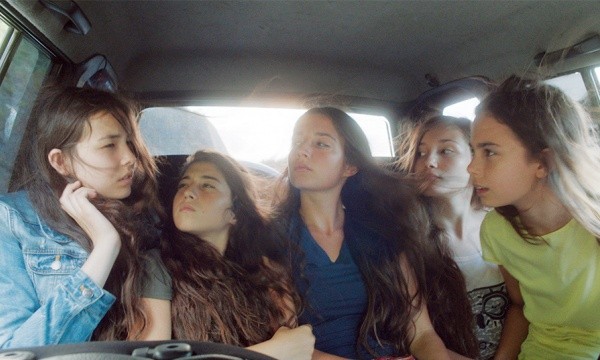
Mustang (2015; dir. Deniz Gamze Ergüven)—Whenever television shows and movies need a quick boost, they reach for a woman to brutalize in the same absent-minded way you or I might reach for a candy bar or some dill pickle chips.
Unfortunately, the sudden spasms of suspense and fear that come from putting women in danger are seldom explored onscreen with any degree of seriousness. That’s why Deniz Gamze Ergüven’s Mustang, France’s official submission for this year’s Best Foreign-Language Film Oscar, is so different and so important: it confronts female exploitation and subjugation from an explicitly female point of view.
Set in northern Turkey, Mustang follows five orphaned adolescent and pre-adolescent sisters—Sonay (Iladya Akdogan), Selma (Tugba Sunguroglu), Nur (Doga Zeynep Doguslu), Ece (Elit Iscan) and Lale (the indomitable Günes Sensoy)—who become the victims of some nasty rumors when they indulge in an innocent after-school romp by the sea with some of their male classmates. Their conservative grandmother (Nihal G. Kodas) and her angry, even more conservative son Erol (Ayberk Pekcan) quell these rumors by pulling the girls from school, locking them in their rooms, and hastily arranging to marry them all off as quickly as possible.
The girls of Mustang are not in full-throated, howling revolt against every facet of the culture; Ergüven’s even-handed storytelling balances patriarchal villainy with unlikely acts of heroism. It’s clear, though, that the girls’ bond is sacrosanct. As they fight to preserve that bond, they end up fighting for what Toni Morrison once called a woman’s right to “choice without stigma.” Sonay seems delighted by her arranged marriage; Selma does not. But neither has a say in the matter, and that’s the problem. (The other sisters respond to the idea of marriage in far less amicable ways.) Lale’s contempt for the “shapeless, shit-colored dresses” they are all forced to wear symbolizes several other repressive, repetitive aspects of the good-wife domesticity they’re being force-fed.
Lale and her sisters’ hunger for life and love and freedom is palpable and poignant; it’s often conveyed through over-the-shoulder handheld camera work so intimate that you may find yourself unconsciously brushing the girls’ hair out of your mouth. The movie’s visual and tonal range is as vast as the mountains they seldom see; it contains one of the year’s most suspenseful set pieces, and it contains a passage of universe-conquering exuberance, too, when the girls hitch a ride to a soccer match and, in spite of the cultural forces holding them back, they can be heroes, just for one day.
Grade: A